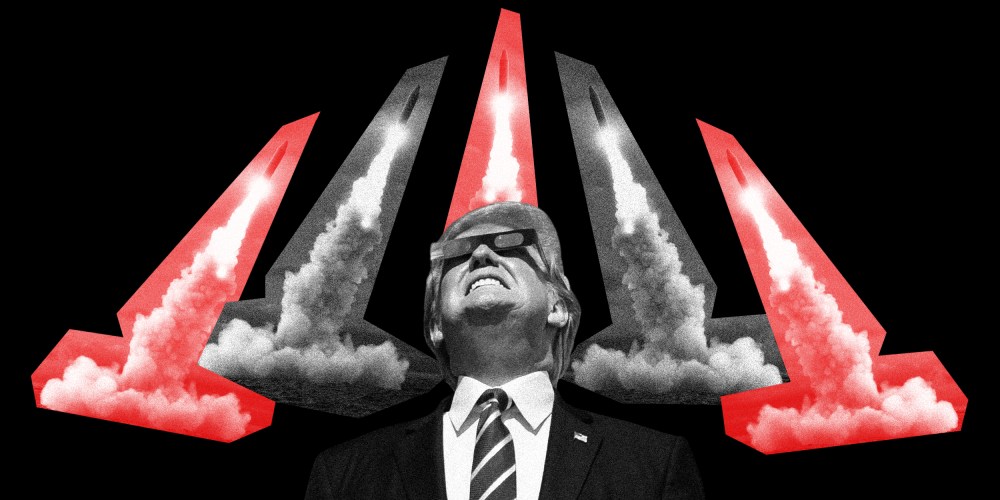President Donald Trump’s rancorously chaotic foreign policy can be seen as successful in one crucial way: It has catalyzed the demolition of an artifice that Trump himself ran against, the idea that America was the indispensable country and that through relationship-building with other countries, it could advance the causes of democracy and freedom. Trump has never believed this: He has always seen America as a corporation involved in high-stakes zero-sum negotiations with cunning adversaries. And to hear him tell it, America always got the short end of the stick.
There is no good news here.
Trump’s defenders will point to his critique in saying that his presidency wasn’t a shambolic failure here, and they won’t engage at all with the calamitous results, as though what matters is the way a dish reads on the menu and not the way it tastes in the mouth. Trump’s malignant narcissism, his conflation of the self with the state and his aggressive incuriosity ensured that nothing palatable will be left on the table.
With trade deals, climate change and, this week, frantic last-minute negotiations to secure an extension of a major nuclear arms control deal with Russia, Trump’s impulses have appreciably increased the chances of global catastrophe.
It’s hard to articulate a coherent narrative that ties together all of Trump’s mistakes, other than that Trump associates everything that Barack Obama touched with weakness and thus that it has to be dismantled. This includes New START, a strategic arms limitation treaty that Obama signed in 2010 with Dmitry Medvedev, Russia’s president at the time. It was to be the centerpiece of Obama’s foreign policy legacy: a step toward “global zero” — a world free of nuclear weapons.

With less than two weeks before the election, it seems that Russia and the U.S. have agreed to extend New START for a year, with a new contrivance called a “freeze” on new weapons — the definition is unclear, and both countries interpreted it differently in their written statements this week. This might allow Trump to say he was able to get something extra that Obama didn’t. It also means, though, that Trump actually got nothing he wanted, felt acute pressure to make a deal, and got robbed in the end. Russia can claim that the freeze means whatever it wants, which will make it hard for the U.S. president to negotiate a new deal without an existing one, given that the president remains accountable to the Senate.
Trump got nothing he wanted, felt acute pressure to make a deal, and got robbed in the end.
The treaty placed limits on deployed “strategic” weapons, basically high-yield warheads, to 1,550 for each country. The platforms that are used to “deliver” them — missiles, fighter bombers, submarines — are limited to 700. Enhancing and extending this treaty should have been a no-brainer for Trump: an easy win, a way for him to brag that he could get things done with Russian President Vladimir Putin in the way he envisioned that a better relationship might help him. The theory of the case was that Russia wants to be seen as a global power; it views arms control agreements with the U.S. as a crucial part of its esteem as a nation, a co-equal power to the U.S.
Russia needs the treaty to give it more time to modernize its arsenal. It has rapidly developed new weapons and hypersonic missiles, but Russia, which has far fewer resources to devote to its nuclear program than the U.S. does, can’t field them quickly enough to make a difference in the near term. The advantage should have gone to the U.S., which could have used the extension debate to press Russia to be more transparent about its secret nuclear projects.
But that’s not what happened. Trump’s strategy vitiated his own advantage. First, he decided to withdraw from three other treaties. One of them limited the testing and deployment of “intermediate range” missiles. Russia had cheated, and where Obama was willing to overlook that, Trump wasn’t. Getting out of this treaty wasn’t ideal, but it was rational. It signaled to Russia that Trump was done with the old order, which had allowed Russia to get away with stuff the U.S. wouldn’t even attempt.
The rest of his nuclear policies jumbled the message. The treaty with Iran that Obama signed in 2015? Gone, without renegotiation, with no workable way to prevent Iran’s nuclear programs from proliferating, short of an actual pre-emptive attack. Diplomacy with North Korea? Getting the two leaders to talk was a feat, but Kim Jong Un rolled Trump when, in exchange for an amorphous ban on testing new nuclear warheads, he obtained an official certificate of legitimacy as a nuclear power and continues to develop more weapons.













